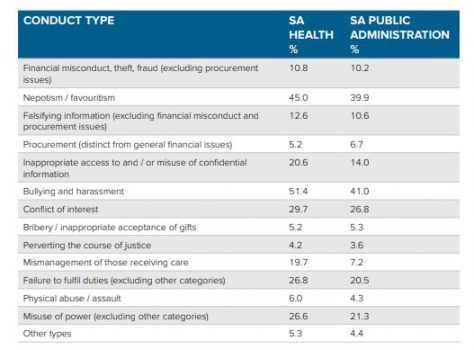Poor conduct, shoddy record keeping, financial mismanagement, bullying and corruption risks have infected South Australia’s health department, according to a scathing report by the state’s corruption watchdog.

ICAC Commissioner Bruce Lander handed down his report into governance at SA Health this month, declaring “I have formed the view that poor conduct and practices are common and accepted within SA Health. I cannot quantify the extent to which this is happening or the cost to the taxpayer. However, I can confidently state that it is not insignificant.
“This report makes plain that the governance of this pressed-upon sector is ambiguous and uncertain, which is an unfavourable combination of factors for ensuring SA Health’s integrity.”
The report, titled Troubling Ambiguity, found a mountain of questionable cultural and governance issues within SA Health that Mr Lander said provided fertile ground for misconduct and maladministration to flourish.
He said a culture of bullying and harassment not only threatened the health, safety and morale of employees, but hindered investigations because SA Health employees are too frightened to speak up.
There was also an “environment where personal interests are preferred at the expense of the public interest” and poor records management, which meant some decisions were not documented and approvals and authorisations were made in an ad hoc manner.
SA health was also failing to monitor how much its highly paid specialist contractors were working, and how well they were carrying out their duties.
The Commissioner also reported poor contractual and financial management of clinical trials, conflicts of interest and “irregular and mismanaged” procurement practices by an agency that accounts for roughly 38 per cent of the state’s procurement activity.
“Because of the troubling ambiguity surrounding some key features of SA Health’s operations, those employees wanting in integrity have been tempted to engage in improper conduct, and their conduct has been facilitated, tolerated, and even condoned by the poor processes and governance in those areas,” he said.
“SA Health remains at risk because its practices, policies and procedures do not appear to sufficiently guard against corruption and serious or systemic misconduct or maladministration.”
The Department has been the subject of 1,166 complaints to the Office of Public Integrity since it was established in 2013, the report notes, amounting to 18 per cent of all public administration complaints in the state.
Cultural issues
Mr Lander said more SA Health employees said they had experienced corruption across almost all categories than the wider public administration.
Forty-five per cent said they had experienced nepotism, compared to 39.9 in the wider public administration, and 20.6 of SA Health employees had experienced misuse of confidential information, compared to 14 per cent of their colleagues in other areas.
However, they were too “culturally unwilling” or frightened to report it.

“The data establishes that SA Health respondents have experienced more instances of corruption and feel more vulnerable to corruption than the rest of public administration,” Mr Lander said.
“SA Health respondents are less willing or confident to report corruption and inappropriate conduct and have less confidence in SA Health’s ability to manage and deal with corruption risks.
“An analysis of the responses in the survey suggests SA Health has a low level of integrity maturity and perceives itself as possessing significant corruption, misconduct and maladministration risks, which SA Health is ill-equipped to detect, prevent or manage.”
The report said 51 per cent of SA Health employees reported encountering bullying and harassment and 78 per cent rated SA Health as vulnerable to bullying and harassment.
Poor record keeping
Record management was also slammed as “wholly inadequate for an organisation which is relied upon to deliver a critical public service and … entrusted with administering substantial amounts of public funds”.
Administrators often didn’t know whether records have been kept, where they are kept and how they could be accessed, Mr Lander said, to the extent that it had hampered his inquiry into the 2017 Oakden nursing home scandal.
He also found “considerable ambiguity and uncertainty” about how salaried specialists contracted by SA Health were supposed to deliver their contractual obligations, or whether they were providing value for money for the department.
In some cases, specialists had allegedly been paid from the public purse while working in the private sector on SA Health time, or claiming full-time wages while only working three days.
“The ill-defined employment obligations and insufficient means of validating the performance of contractual duties gives rise to an increased risk of corruption and maladministration in public administration,” Mr Lander said.
Government News has sought comment from SA Health.





Leave a Reply